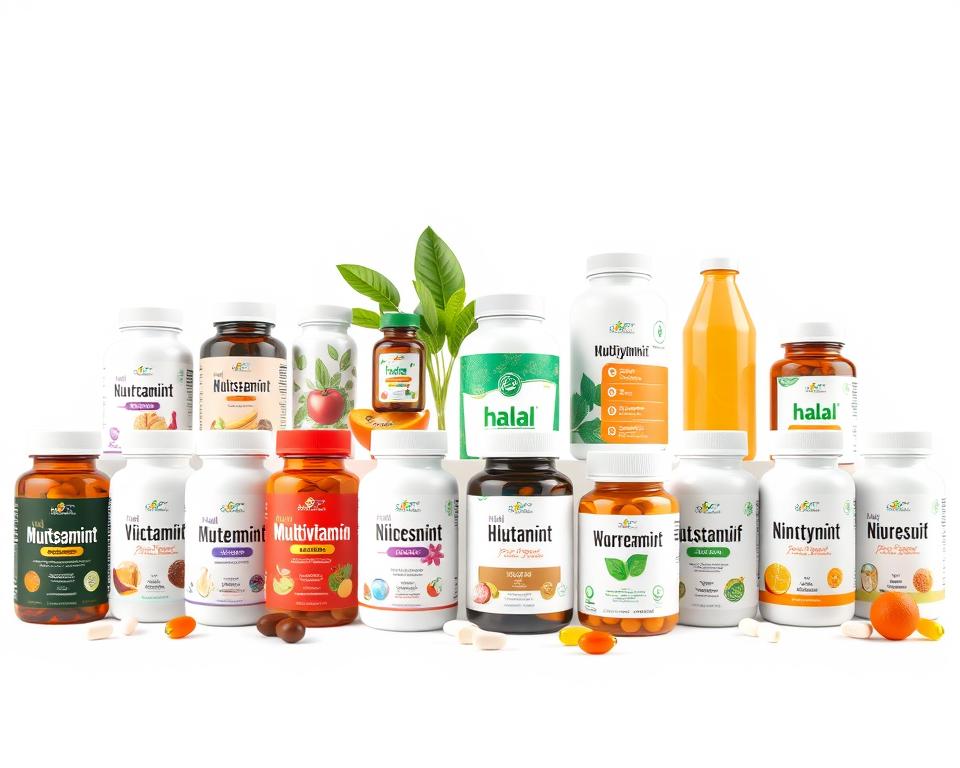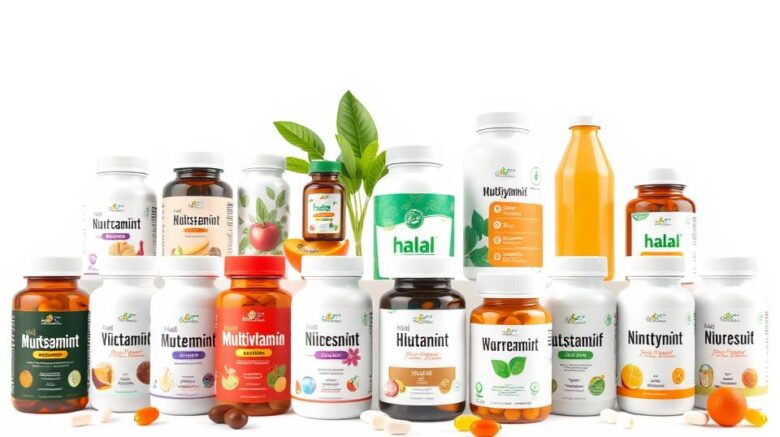Halal Multivitamin Supplements: What You Need to Know
Do you ever question if your vitamin intake reflects your ethical choices and nutritional demands? The search for halal multivitamin supplements is expanding, motivated by individuals wanting to follow Islamic dietary rules and keep healthy. The shift points to a wider embrace of halal nutrition, balancing well-being with adherence to personal values. In this article, we delve into halal health’s relevance and what distinguishes these halal supplements as leading picks.
What Are Halal Supplements?
Halal supplements cater to individuals observing Islamic diet regulations. They are carefully checked to meet these standards, avoiding any ingredients from pork, alcohol, or non-halal animals. The surge in health consciousness has elevated interest in halal nutritional products. Modern consumers seek transparency regarding production methods and ingredient origins.
Halal health supplements excel by following principled, ethical production processes. Companies have to verify their products do not include any disallowed substances. Purity-driven practices boost both nutrient quality and consumer trust in halal-labeled brands.

Benefits of Halal Multivitamin Supplements
Going for reputable halal multivitamins yields major benefits for those balancing health goals with religious adherence. They comply with Islamic dietary requirements and simultaneously enhance general well-being. By offering crucial nutrients, they enhance energy and bolster the immune defenses.
The widening Muslim demographic fuels demand for goods that uphold cultural norms and spiritual beliefs. These supplements draw in individuals focused on ethical sourcing, aside from purely religious reasons. Their exclusion of any forbidden substances makes them attractive to vegans, vegetarians, and health-conscious buyers.
Opting for halal-certified options means trusting in their truthful and open manufacturing practices. This builds trust among consumers, showing they’re making a healthy choice. Integrating halal multivitamins into your regimen boosts energy and provides reassurance.
Essential Components of Halal Multivitamins
These supplements strive to deliver crucial vitamins and minerals derived from permissible, safe origins. They feature compounds that support holistic health while respecting dietary regulations. Major elements consist of:
- Vitamin D from lichen for Vitamin D, ensuring a plant-based alternative suitable for halal health.
- Beetroot-sourced iron, serves as a wholesome, halal-approved iron source.
- Algae oil–based omega-3, providing a vegan-friendly option that aligns with halal guidelines.
Ensure any animal-sourced additives, including gelatin and whey protein, hold halal certification. This check guarantees the animal-based ingredients follow halal slaughter and processing protocols. Going with halal vitamins backs ethical diets and fosters a complete health strategy.
Haram Ingredients You Should Avoid
Examining these supplements demands vigilance for any haram components. These substances can undermine the integrity of halal nutrition. One must make sure chosen supplements conform to halal laws and personal convictions.
Gelatin, often derived from pork, is a common haram ingredient in supplements. Those containing alcohol solvents or non-halal animal enzymes must be excluded. Even mineral stearate and glycerin could breach halal rules if derived from forbidden items. Opting for vegetarian or plant-based options eliminates these risks.
Understanding haram ingredients is critical for those dedicated to halal dietary practices. With this awareness, consumers can choose truly halal supplements that support health without contravening faith.
Tips for Recognizing Genuine Halal Vitamins
Carefully reviewing product packaging is key to finding halal-certified vitamins. Check for the halal mark, proving the supplement meets strict halal requirements. Such a label confirms adherence to rigorous halal standards.
Also, make a point to inspect every ingredient stated on the package. Confirm that all animal components comply with halal processing regulations. Pay special attention to gelatin, as it could be non-halal if improperly sourced. Validating the halal nature of ingredients ensures you make the right selection.
Reaching out to producers for details can clear up any uncertainty. They’re able to explain in depth how they achieve and maintain halal certification. This can boost your confidence in the product you choose. Adhering to this process guarantees your halal vitamin choices align with your dietary beliefs.
Halal Status of Gummy Vitamins: What to Know
Chewable gummy vitamins are increasingly popular with children and grown-ups alike, adding a flavorful twist to nutrition. The issue arises because most gummy formulas contain pork-derived gelatin, making them non-halal.
Today you can find gummy vitamins certified halal, swapping gelatin for vegan-friendly pectin or carrageenan. The use of these vegan thickeners enables guilt-free gummy consumption in line with halal guidelines. It’s key to check the ingredient list and look for halal certifications when picking halal vitamins for Muslims.
Choosing the right halal supplements can boost your wellness while sticking to your dietary preferences.
| Brand | Type | Halal Compliance | Key Ingredients |
|---|---|---|---|
| SmartyPants | Gummy Multivitamins | Halal Certified | Pectin, Vitamin D, Omega-3 |
| NutraBlast | Gummy Immune Support | Halal Certified | Carrageenan, Vitamin C, Zinc |
| MaryRuth Organics | Gummy Probiotics | Halal Certified | Pectin, Probiotic Blend |
Halal Protein Powder: An Option for Active Lifestyles
For those dedicated to an active lifestyle, halal protein powder is a valuable addition. Derived from sources like whey, these powders are key for muscle recovery and growth. Be vigilant about scanning ingredient lists to avoid any impurities that breach halal guidelines.
To meet consumer expectations, many suppliers highlight halal credentials and supply chain transparency. The move supports fitness enthusiasts seeking assurance that their protein aligns with halal practices. Selecting halal protein powders upholds religious dietary needs and contributes to general wellness.
| Brand | Type of Protein | Certification |
|---|---|---|
| Optimum Nutrition | Whey Protein Isolate | Halal Certified |
| Orgain | Plant-Based Protein | Halal Certified |
| Muscle Milk | Protein Powder Blend | Halal Certified |
Adding halal protein powder to your diet can support your fitness goals while staying true to halal principles.
Halal Vitamins That Enhance Immunity
Halal vitamins become especially important amid flu outbreaks or worldwide health emergencies. These formulations typically include vitamins A, C, D3, and zinc. These components enhance immune function while observing halal dietary principles. A diverse selection of top halal-certified products is available to meet immune support demands.
An increasing assortment of halal-approved products is now on the market. These offerings are formulated to boost health in line with halal principles. These products supply vital elements that support robust immunity. Adding these supplements to your habit encourages top health and maintains spiritual integrity.
The Final Word
Halal-certified supplements are now central to many health-focused markets. Such supplements speak to people committed to healthy living without compromising their beliefs. With more halal vitamins available, people can now meet their health needs while staying true to their values. This evolution paves the way for improved holistic health for Muslim consumers.
Knowing how certification works and reading labels carefully is crucial. It guides purchasers to make decisions aligning with halal dietary requirements. By doing so, one can boost health without compromising faith-based practices.
As halal-certified products proliferate, people have new ways to blend ethics with health. Selecting these vitamins fosters a health strategy that respects personal convictions. It acknowledges and upholds personal spiritual and lifestyle commitments.
